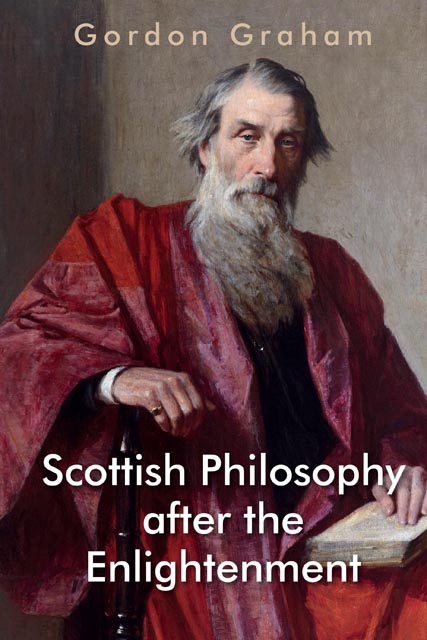Book contents
- Frontmatter
- Contents
- Preface and Acknowledgements
- Series Editor’s Introduction
- A Note on Women in Scottish Philosophy: Mrs Oliphant
- A Chronology of Scottish Philosophy after the Enlightenment
- 1 An Autobiographical Prologue
- 2 Sir William Hamilton and the Revitalisation of Scottish Philosophy
- 3 James Frederick Ferrier and the Course of Scottish Philosophy
- 4 Psychology and Moral Philosophy: Alexander Bain
- 5 Thomas Carlyle and the Philosophy of Rhetoric
- 6 Hegelianism and its Critics
- 7 Scottish Philosophy’s Progress
- 8 Religion, Evolution and Scottish Philosophy
- 9 The Gifford Lectures and the Re-affirmation of Theism: Alexander Campbell Fraser
- 10 The Culmination of Scottish Philosophy: A. S. Pringle-Pattison
- 11 John Macmurray and the Self as Agent
- Bibliography
- Index
11 - John Macmurray and the Self as Agent
Published online by Cambridge University Press: 07 June 2023
- Frontmatter
- Contents
- Preface and Acknowledgements
- Series Editor’s Introduction
- A Note on Women in Scottish Philosophy: Mrs Oliphant
- A Chronology of Scottish Philosophy after the Enlightenment
- 1 An Autobiographical Prologue
- 2 Sir William Hamilton and the Revitalisation of Scottish Philosophy
- 3 James Frederick Ferrier and the Course of Scottish Philosophy
- 4 Psychology and Moral Philosophy: Alexander Bain
- 5 Thomas Carlyle and the Philosophy of Rhetoric
- 6 Hegelianism and its Critics
- 7 Scottish Philosophy’s Progress
- 8 Religion, Evolution and Scottish Philosophy
- 9 The Gifford Lectures and the Re-affirmation of Theism: Alexander Campbell Fraser
- 10 The Culmination of Scottish Philosophy: A. S. Pringle-Pattison
- 11 John Macmurray and the Self as Agent
- Bibliography
- Index
Summary
I
Chapter 10 concluded with the claim that Andrew Seth Pringle-Pattison brought the Scottish philosophical tradition to a close. This contention is not universally accepted. Though there has been little discussion of the issue, a few commentators have extended the tradition considerably past this point by identifying John Macmurray (1891–1976) as a representative of Scottish philosophy. All the philosophers considered in previous chapters, even those who lived into the twentieth century, were essentially products of nineteenth-century Scotland. Macmurray, by contrast, was a philosopher of the twentieth century. What he does have in common with, for example, Hamilton, Bain, Ferrier and Caird is the fact that, having been acclaimed in his own time, his copious publications have been remarkably neglected by both contemporary philosophical discussion and the history of philosophy. Accordingly, this final chapter has a twofold purpose. First, in light of the conclusion of the previous chapter, it will aim to identify Macmurray’s relation to the Scottish philosophical tradition. Second, in the course of doing so, it will try to recover something of his significance as a thinker.
According to Alexander Broadie in A History of Scottish Philosophy, it is a mistake to confuse the Scottish philosophical tradition with the ‘Scottish School of Common Sense’.
Scottish philosophy is a good deal wider than the school of common sense philosophy. I am speaking here of a long tradition of philosophizing traceable back to the thirteenth century … As regards the Scottish philosophical tradition the first major thinker was Duns Scotus … His philosophical successors of the Pre-Reformation period, especially John Mair, were philosophically very close to him … and … it may reasonably be supposed that when Mair taught at Glasgow … and St Andrews … his interest in Scotus’s philosophy was on display. Mair’s persistent reference to Scotus as conterraneus, my fellow countryman, indicates his sense of closeness to the earlier man … [W]ith the arrival in Scotland of the Reformation and renaissance humanism, philosophy in Scotland, as elsewhere in Europe, went through a process of renewal … The brilliant philosophy contributed by Scots [during the eighteenth century] to the great western philosophical project did not come from nowhere, appearing in Scotland as if by miracle, but on the contrary was a continuation of a long tradition of Scottish philosophizing. (Broadie 2009: 4–5)
- Type
- Chapter
- Information
- Scottish Philosophy after the Enlightenment , pp. 206 - 230Publisher: Edinburgh University PressPrint publication year: 2022



